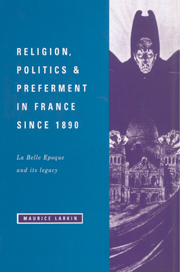Book contents
- Frontmatter
- Contents
- Preface
- Part 1 As it was: Catholics and the Republic, 1890–1914
- Part 2 As it was: Catholics and state employment, 1890–1914
- Part 3 As it became, 1914–1994
- 9 La grande illusion? 1914–1939
- 10 The leopard's spots: 1940–1960
- 11 Croquet through the looking glass: rules and identity in question, 1960–1994
- Map: Religious observance in France, c. 1960.
- Notes
- Sources
- Index
11 - Croquet through the looking glass: rules and identity in question, 1960–1994
Published online by Cambridge University Press: 27 January 2010
- Frontmatter
- Contents
- Preface
- Part 1 As it was: Catholics and the Republic, 1890–1914
- Part 2 As it was: Catholics and state employment, 1890–1914
- Part 3 As it became, 1914–1994
- 9 La grande illusion? 1914–1939
- 10 The leopard's spots: 1940–1960
- 11 Croquet through the looking glass: rules and identity in question, 1960–1994
- Map: Religious observance in France, c. 1960.
- Notes
- Sources
- Index
Summary
For much of the twentieth century, constitutional and religious issues played a more prominent role in French politics than in most of the democracies of north-western Europe. In countries such as Britain and the Scandinavian kingdoms, politics have tended to be bipolarised on matters of social and economic policy and the distribution of income, whereas in France it is only in the last thirty years that socio-economic issues have not had to share public attention with major differences over the constitution and the place of religion in society. Hitherto, as Philip Williams said of the Third and Fourth Republics, ‘three issues were fought out simultaneously: the eighteenth-century conflict between rationalism and Catholicism, the nineteenth-century struggle of democracy against authoritarian government, and the twentieth-century dispute between employer and employed’. The Second World War and its aftermath saddled French politics with a fourth issue – a crisis of national self-esteem arising from the disintegration of empire. Overburdened, the Fourth Republic collapsed beneath the divisive weight of these four problems, each of which cut across opinion in a different direction – thereby making coherent governmental majorities increasingly difficult to find.
The following decades, however, saw these debilitating issues virtually reduced to one – or so it seemed to many contemporaries. What is often called ‘the social contest over the distribution of the national income’ now dominated the stage; and observers claimed that French politics had belatedly come of age. France had taken her place among the advanced democracies, where power could be expected to alternate between the disciplined forces of Right and Left, taking their stance mainly on socioeconomic matters.
- Type
- Chapter
- Information
- Religion, Politics and Preferment in France since 1890La Belle Epoque and its Legacy, pp. 194 - 205Publisher: Cambridge University PressPrint publication year: 1995



